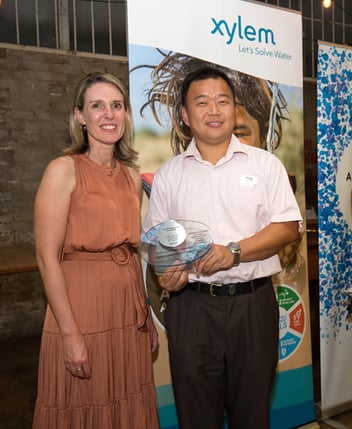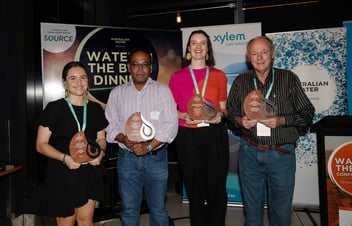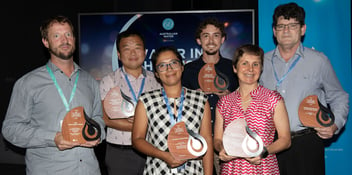AWA Talking Water panel boosts Aboriginal perspectives and participation in the sector
Power and Water Corporation is leading the water industry in ensuring Indigenous peoples are included via community consultation and ongoing employment, and one engagement specialist is encouraging all water sector businesses to create more inclusive workplaces, too.
Donna McMasters, Team Leader for Aboriginal Employment and Development at Power and Water Corporation, said working in collaboration with communities is crucial to ensuring more Aboriginal perspectives are heard and actively involved within the sector.
McMasters recently participated in the panel “Kwatja Ngkama (Talking Water)” at AWA’s Water in the Bush Conference in Darwin, which also featured AWA CEO Corinne Cheeseman. The panel came together to open up a conversation with delegates on the importance of Indigenous water knowledge and engagement.
“We need to be working together in collaboration and sharing our stories. Aboriginal people have their own knowledge and ways of doing things, but this knowledge has been left behind,” McMasters said.
“We need to work more in collaboration to share the different knowledge, stories and experiences. We are getting there; we certainly are working towards it. But I think the sector can do a bit better.
“I grew up in Alice Springs and the Coolabah Swamp (Ankerre Ankerre). Back then it was like a forest, very bushy. Now it is bare, sad and aged. But that’s what development does; development doesn't work with Aboriginal people if we are not involved.
“Aboriginal people are invited to get involved at the last minute, but we need to be involved during early conversations about projects, design and developments.”
McMasters said one of the barriers to increasing Aboriginal participation in the water sector revolves around how opportunities are offered and how Aboriginal people are engaged.
“Jobs are limited and construction is often in specialised areas, whether it's building new tanks or replacing reticulation systems, or changing water supply from surface water to bore water,” she said.
“One of Power and Water Corporation’s priorities for capital projects was working with the contractor to support local economic development. But the contractor found it hard to understand or engage in local employment.
“It’s all about how you engage, how you devise your messaging, how you respect the community, respect the difference, respect diversity. It’s important to respect the fact that we are going onto someone else's Country.
“Increasing successful engagement is about working with our contractors and staff to bring them on a journey of cultural learning.”
Committed engagement
While there have been challenges, McMasters said Power and Water Corporation is committed to helping support Aboriginal community members in successfully training to become part of water industry operations and management works.
“I got where I am today because I worked with mentors who helped me build my confidence, as well as strengthen my work ethic and time management skills. With our projects I did the same thing,” she said.
“I worked with the contractor to make sure they understood the community, but also ensure they are flexible, in terms of allowing time for training and upskilling.”
In 2017, Power and Water Corporation developed a Reconciliation Action Plan (RAP) and, as of last year, completed all deliverables. The utility currently employs 80 Aboriginal staff out of 770.
In order for the water sector to step up to the outstanding record Power and Water Corporation has created, McMasters said it’s important to recognise that there is still a lot to be learned, including new ways of including Indigenous knowledge within current sector practices.
“We are still all within a very big learning phase. There are lots of levels of detail that we have not been exposed to in terms of Aboriginal knowledge. It’s important that we keep working towards raising cultural awareness among our staff,” she said.
“In 2015, Power and Water Corporation introduced the Indigenous Employment and Career Development Strategy. This aimed to improve participation rates and mentoring, as well as career pathways. We also support the NT Government Aboriginal Employment programs — one is the Special Measures Policy.
“This policy is applied to all of our vacancies at Power and Water, to give Aboriginal people an opportunity to get assessed first from all other applicants, to see if they are at level.”
Early involvement
Speaking on the panel, AWA CEO Corinne Cheeseman agreed that including Aboriginal knowledge and perspectives during early conversations around water projects and management initiatives is crucial to promoting and achieving higher participation rates within the sector.
“We really need to think about engaging Indigenous people in the community early. One of the invaluable elements of Indigenous knowledge is that they share information about places through generations, which means they have an understanding of how things were generations ago,” Cheeseman said.
“Impacts on water might be caused by climate change, or development, or different ways in which the water is managed and used, but it’s that intergenerational knowledge and history that can add so much value. We would all be much better off having Indigenous people involved in conversations around water much earlier.”
Meanwhile, Cheeseman said the AWA will continue to work with its members to lay the foundation for a more inclusive and collaborative water sector moving forward.
“We’d like to provide the opportunity to engage and raise awareness around issues, but also to work in partnership. There are opportunities to increase inclusiveness. There are benefits for everyone when working together and sharing knowledge, whether its Indigenous knowledge, cultural knowledge, or scientific knowledge,” she said.
“Under our Strategy ’22, Indigenous engagement is one of our key initiatives. We are now working towards developing our RAP, in consultation with our members.
“We have also been showcasing some of the great work that is happening across the water industry already to further strengthen awareness around Indigenous culture and the benefits of increasing participation.”



